- Home
- Lauren Tarshis
I Survived the Great Chicago Fire, 1871
I Survived the Great Chicago Fire, 1871 Read online
CONTENTS
TITLE PAGE
DEDICATION
CHAPTER 1
CHAPTER 2
CHAPTER 3
CHAPTER 4
CHAPTER 5
CHAPTER 6
CHAPTER 7
CHAPTER 8
CHAPTER 9
CHAPTER 10
CHAPTER 11
CHAPTER 12
CHAPTER 13
CHAPTER 14
CHAPTER 15
WALKING IN OSCAR’S FOOTSTEPS
QUESTIONS AND ANSWERS ABOUT THE GREAT CHICAGO FIRE AND MORE
FOR FURTHER READING AND LEARNING
ABOUT THE AUTHOR
COPYRIGHT
The fire started inside a barn.
It was tiny at first, a glowing dot, some wisps of white smoke.
But then flames reached up.
They grabbed hold of a pile of hay.
Crackle!
Pop!
And then,
Boom!
Towers of flame shot up, higher, higher, punching through the roof, reaching for the sky.
Voices screamed out.
“Fire! Fire! Fire!”
Alarm bells clanged. Firefighters readied their horses and raced their pumpers through the streets.
But it was too late.
The flames blasted a shower of fiery sparks into the windy sky. Like a swarm of flaming wasps, they flew through the air, starting fires wherever they landed. Shops and homes erupted in flames. Warehouses exploded. Mansions burned.
Crowds of panicked people fled their houses and rushed through the streets and along the wooden sidewalks. They screamed and pushed and knocked one another down, desperate to get away from the choking smoke and broiling flames.
But there was no escape.
The winds blew harder. Flames shot hundreds of feet in the air, spreading across miles and miles.
And in the middle of it all was eleven-year-old Oscar Starling.
Oscar had never felt so terrified, not even two years ago, when a killer blizzard hit his family’s Minnesota farm.
He was trapped inside a burning house, fighting for his life. He’d made it down the stairs, desperate to escape. And then,
Crash!
A ball of fire and cinders crashed through the window, and the house exploded in flames. And suddenly, Oscar was in the fire’s ferocious grip. The flames clawed at him, seared him, threw him to the ground. Smoke gushed up his nose and into his mouth. But the worst was the blistering heat, the feeling of being roasted alive.
Was this the end?
Oscar had never wanted to come to this city.
And now he was sure he was going to die here.
Don’t puke.
That’s what Oscar had been telling himself for the past nine hours as the train chugged and swayed and jerked its way toward Chicago. They’d crossed four hundred miles of wide open prairie. For hours, Oscar had been staring out the window. There had been nothing to see but shoulder-high grass and a few scrawny buffalo that seemed to wave good-bye to Oscar with their swishing tails.
Now that they were getting closer to the city, Oscar couldn’t bear to look. He slouched down in his seat and glued his eyes to his dusty boots.
“Are you feeling all right, Oscar?” Mr. Morrow said.
“I’m fine, sir,” Oscar lied.
“Such a long trip,” Mama said, her freckled face shining with excitement. “I feel like we’re heading up to the moon!”
Mama and Mr. Morrow both laughed, but nothing seemed funny to Oscar. So much had happened these past few weeks. He was in a state of shock. Mama had married Mr. Morrow. They had sold the Minnesota farm where Oscar had lived his entire life. And now they were moving to a strange city that might as well be the moon.
No wonder Oscar felt sick.
Of course the real nightmare had happened two years ago, when Papa died.
He was killed in a vicious blizzard, a wall of ice and snow and wind that slammed into their prairie town with no warning. Papa had been trying to get home. His wagon crashed into a tree in the blinding snow.
Even now, Oscar couldn’t believe that Papa was gone.
Papa was the toughest man Oscar knew. He’d been a sheriff in Dakota Territory. He’d survived a gunfight with one of the most brutal outlaws in the West. He’d carved a farm out of forty acres of wild prairie.
Papa was Oscar’s hero.
Those first weeks after Papa died, Oscar was sure his sadness would rip him apart. But he couldn’t just lie in bed sobbing. With Papa gone, it was Oscar’s job to help Mama with the farm. He made a whispered promise to Papa — to watch over the farm, to work as hard as he could to keep it going.
He worked before dawn and after school. He worked so hard he’d fall into bed every night, too exhausted to think.
Mama wanted Oscar to see his friends.
“Maybe tomorrow,” Oscar always answered.
“Then come sit with me awhile,” Mama would say. “Let’s play cards.”
He and Mama and Papa used to play fierce games of hearts. When Papa lost, he’d pretend to fly into a rage, pounding the table while Mama and Oscar doubled over laughing.
But Oscar had no time for cards. All he wanted to do was work.
The seasons passed in a blur of sweat and dirt and aching muscles.
And Oscar would have just kept on going. But then, six months ago, Mr. Charlie Morrow appeared at their door.
Mr. Morrow was an artist for a big Chicago newspaper. He’d come to Castle for his latest project, which was to paint scenes of life in a booming little prairie town. Mama was honored when Mr. Morrow stopped by and asked if he could paint their farm.
Each morning for a month, Mr. Morrow would show up just after the sun rose, waving at Mama and Oscar with his paint-stained fingers. “Hello!” he’d sing out.
He was a big man, with jet-black hair and a beard to match. Mama said he reminded her of a giant from a fairy tale. “But the nice kind,” she explained.
Oscar liked Mr. Morrow well enough. He made Mama smile, that was for sure.
Most nights after Mr. Morrow packed up his paints, he’d join them for supper. Afterward he and Mama would sit out on the porch and look over the day’s paintings.
“Oscar, join us,” Mr. Morrow would boom.
But why did Oscar need to look at paintings of his farm? He lived there!
So he’d make excuses and then fall asleep to the sound of Mr. Morrow and Mama’s soft laughter drifting upstairs. After Mr. Morrow went back to Chicago, Mama seemed to get a letter from him every single day.
So maybe Oscar shouldn’t have been shocked when, two months ago, Mama sat Oscar down under the apple tree with some big news.
“He’s asked me to marry him,” she said.
At first Oscar laughed.
Mr. Morrow? He was nothing like Papa! He was an artist. An artist! Was that even a job?
But then Oscar noticed how Mama’s eyes were twinkling.
“Oscar,” she said. “I want to say yes.”
Oscar stopped laughing.
“He’s a wonderful man,” she said. “And what a life we’ll have with him in Chicago.”
At first Oscar just sat there like he’d been smacked in the head with a shovel.
Leave the farm? Move to Chicago?
What about his promise to Papa?
Oscar begged Mama. He pleaded with her. He tried to make her understand that they needed to stay in Castle.
“Papa wouldn’t want us to leave here!” he exclaimed.
But then Mama looked at Oscar with her hopeful eyes.
“Oscar,” she said quietly, putting her hand up to Osca
r’s cheek. Her fingers were like Oscar’s, covered with calluses and scars from all the scrubbing and weeding and washing that filled her days. “All Papa ever wanted was for us to be happy.”
And Oscar could see that she had made up her mind.
Oscar could have run away, or refused to get on the train.
But he didn’t have the guts.
So now here he was, miserable, chugging along with his stomach turning inside out.
The train whistle shrieked.
Woooooo! Wooooooo!
“Chicago!” the conductor shouted out. “Ten minutes!”
Oscar’s stomach flipped.
Don’t puke!
His stomach didn’t listen.
He managed to slam open the window just in time to splatter his lunch across the tracks.
Welcome to Chicago.
Oscar stared out the window in shock as the train pulled into the city.
Chicago was called the Queen of the West.
But what an ugly queen!
All along the tracks were factories and warehouses. The sky was smudged dirty brown from coal fires and dark clouds burping out of smokestacks.
Soon enough, they were off the train and standing in the enormous station hall. Every other person smiled and waved at Mr. Morrow.
“Charlie!” a man boomed.
“Welcome back, Mr. Morrow,” said a porter lugging a heavy suitcase.
“Mr. Morrow, I loved your latest pictures!” a pretty woman gushed.
“Good to be back!” Mr. Morrow beamed.
People swarmed around the station — more people than Oscar had seen in all of his life. Everyone was rushing around as if they were late for church.
And suddenly, Oscar noticed the rotten stench that filled the air. He had never smelled anything as disgusting. It was like someone had tossed a hundred skunks into a hot outhouse and left them there for a month.
Oscar could see from Mama’s crinkled-up nose that she noticed it, too.
“The slaughterhouses,” Mr. Morrow said, reading their sickened expressions. “They butcher more hogs in Chicago than anywhere in the world.”
Mr. Morrow went to the baggage room and returned with their three suitcases. Oscar’s was the smallest. Inside was all that was left from his life on the farm: his few clothes and his prized possession — Papa’s sheriff’s badge, a five-pointed silver star.
“Is there somewhere I can freshen up?” Mama asked, smoothing one of the golden curls that had popped out of her bun.
“I’ll show you,” Mr. Morrow said, taking Mama’s arm. “Oscar, can you keep an eye on the bags?”
Oscar nodded.
But as they disappeared into the crowd, Oscar’s heart thumped.
He felt so out of place here, and strangely all alone. A bunch of rough-looking boys lurked around. One of them stared at Oscar. He had bright red hair and strange yellow-tinged eyes that reminded Oscar of a rattlesnake’s. Oscar was relieved when they drifted away.
He took a deep breath and looked around, thinking about Papa’s one visit to Chicago. Papa was just twenty years old at the time. His parents had both died, and Papa had decided to leave his hometown near Boston and head west.
“I was looking for my fortune,” Papa always said.
He landed in a no-name town in Dakota Territory. The town was desperate for a sheriff, and Papa needed a job. For months the place was quiet — until the night a gang of outlaws rode in.
Their leader was Earless Max Kildair.
“Actually, Earless did have one ear,” Papa had explained to Oscar. “He lost the left one blowing up a safe during a bank robbery.”
Papa heard that Earless Kildair was a killer. And sure enough, by morning the town’s bank had been robbed, and one of Papa’s friends was sprawled out dead in the street. Earless and his gang were long gone.
Papa went after the gangster, chasing him all the way to Chicago. He finally found him in a stinking tavern near the river. Papa pulled out his gun, ready to arrest him. But Earless was too quick. He jumped behind the bar and started shooting.
Pow!
A bullet whizzed just past Papa’s head.
Pow!
Papa fired back but missed.
Earless lunged forward with a final shot.
Pow!
The bullet hit Papa in the chest. It should have torn a hole right through Papa’s heart. But it ricocheted off his badge instead, leaving a big dent smack-dab in the center.
Earless escaped in the commotion.
After that, Papa decided he was done chasing outlaws. He heard about free farmland up for grabs in Minnesota. He’d never farmed, but figured he’d give it a try. He ended up in a little town called Castle, where the first person he met was a freckle-faced schoolteacher with the prettiest blue eyes Papa had ever seen.
Mama.
Within the month, they were married. By the next year they had their farm — and Oscar.
“So I found my fortune,” Papa liked to say, kissing Mama on the cheek.
As for Earless, he was still on the loose. Papa heard he was in Chicago, lying low, but still up to no good.
Oscar’s thoughts of Papa were cut short by a whispering voice.
“Can you help me?”
He looked down at a skinny little girl with a yellow cap over two raggedy braids. She stared up at him with big brown eyes.
“I’ve lost my parents.”
She looked so helpless!
“We’ll find them,” Oscar said, standing a little taller.
“I think they went this way,” she said, leading him by the arm out of the main waiting room.
But then suddenly she let go of his sleeve.
“Sorry,” she said.
And then poof, she disappeared into the crowd.
An uneasy feeling grabbed hold of Oscar.
Something wasn’t right.
He spun around and rushed back to the suitcases.
They were gone.
“Those street kids are vicious,” the policeman said. He looked down at Oscar. “Son, you’re lucky you didn’t get stabbed.”
Mama, Mr. Morrow, and Oscar stood with the policeman on the spot where their suitcases had been. The cop, Officer Brennan, was an old buddy of Mr. Morrow’s. He explained that Oscar had been tricked. That little girl wasn’t really lost. She was a crook, part of a band of thieves.
“She distracted you so the others could steal the suitcases,” Officer Brennan said. “Happens here every day.”
Officer Brennan and three other cops had already scoured the station, but there was no sign of the girl or the bags or those rough boys Oscar had seen. Oscar told the policeman about them, too, including the redheaded boy with the strange eyes.
“Otis Webber,” the cop said, his friendly eyes narrowing. “He’s only fourteen years old, but he’s got the heart of a killer. We hear he works for an older guy. They take helpless orphans and turn them into ruthless criminals.”
Oscar shuddered.
“Will you find our suitcases?” Mama said.
“Doubtful, ma’am,” he said, giving them all an apologetic smile before he left.
Mr. Morrow put his arm around Oscar’s shoulders. “I should have warned you,” he said. “In a big city like this, there are some bad characters.”
“What’s done is done,” Mama said, shaking the worry from her face. “We can all get new clothes. What matters is that here we are, together.”
Mr. Morrow beamed at Mama.
Oscar ducked out from under Mr. Morrow’s arm.
Oscar didn’t care about his clothes. All he cared about was Papa’s badge, which was gone forever.
* * *
It was past 10:00 P.M. when they finally got out of the station and into a cab, a beat-up buggy pulled by a dusty horse. The cabdriver flashed a smile filled with black teeth when he saw Mr. Morrow.
“Charlie!” he cried. “Welcome back!”
Was there anyone in Chicago who didn’t know Mr. Morrow?
“Hello, Joseph!” Mr. Morrow said, patting the man on the shoulder. “Take us to the Palmer House, please.”
Joseph let out a sharp whistle. “Fancy!”
“We’ll have supper there,” Mr. Morrow told Mama and Oscar. “Then we’ll head home. Oscar, I think you’re going to like the house. My father built it. It’s a little far away from things, north of our new park. The best room is my studio. You can look out the windows and see all of Chicago.”
Oscar managed a nod and bit his tongue.
Mr. Morrow’s house would never be home. Home was Papa’s farm, where the air didn’t smell like dead hogs, where the only thieves were the rabbits that stole carrots from the garden.
The horse clattered away from the train tracks and warehouses and onto a wide avenue of grand buildings. Oscar tried not to act like he was impressed, but the buildings were taller than any tree he’d ever climbed.
“Amazing, isn’t it?” Mr. Morrow said, smiling proudly. “When I was born, this city was just a little town on a marsh. Today, Chicago is one of the most important cities in the world.”
“It’s beautiful,” Mama said.
But suddenly Mama’s expression darkened.
“Does the sky look odd to you?” she asked, her brow wrinkling with worry.
Oscar saw it, too, a pale orange glow in the sky.
“Must be a fire,” Joseph said matter-of-factly. “We’re having fires practically every night now. Hasn’t rained here in months. The city is bone-dry.”
The word fire sent a flash of fear across Mama’s face, and it jolted Oscar, too. Three years ago, a massive forest fire had erupted in the woods north of Castle. It burned thousands of acres of pine and birch trees, and then raced across the prairie toward Castle. Dozens of buildings were burned, including Oscar’s barn. The entire town could have been lost. But just as flames were lapping at the edges of Main Street, a big rainstorm blew in and doused the fire.
“Don’t worry,” Mr. Morrow said, giving Mama a reassuring pat. “Chicago has one of the best fire departments in the country. We have close to two hundred firemen and a fleet of the best new steam pumpers. That fire will be out before we finish supper.”
The cab lurched to a stop, and Joseph turned around. “And here we are, folks. Palmer House hotel. Finest in the city.”
They climbed out of the cab, and a man in a top hat swung open the hotel’s huge front door. Oscar peered inside at the glittering lobby. Bright lights twinkled, and piano music filled the air. Oscar lingered outside. He’d never seen such a fancy place, and he was sure he didn’t belong in there.

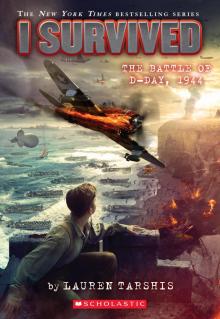 I Survived the Battle of D-Day, 1944 (I Survived #18)
I Survived the Battle of D-Day, 1944 (I Survived #18)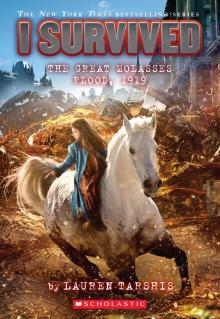 I Survived the Great Molasses Flood, 1919
I Survived the Great Molasses Flood, 1919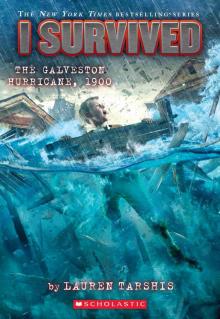 I Survived the Galveston Hurricane, 1900
I Survived the Galveston Hurricane, 1900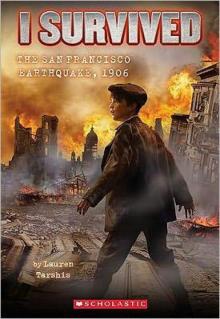 I Survived the San Francisco Earthquake, 1906
I Survived the San Francisco Earthquake, 1906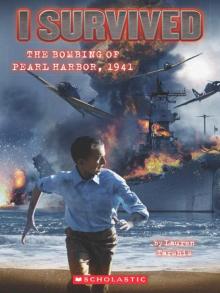 I Survived #4: I Survived the Bombing of Pearl Harbor, 1941
I Survived #4: I Survived the Bombing of Pearl Harbor, 1941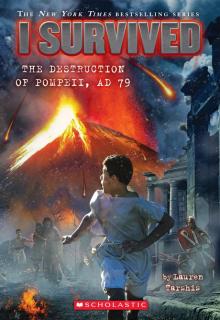 I Survived the Destruction of Pompeii, AD 79
I Survived the Destruction of Pompeii, AD 79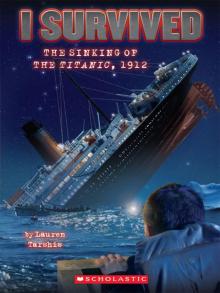 I Survived #1: I Survived the Sinking of the Titanic, 1912
I Survived #1: I Survived the Sinking of the Titanic, 1912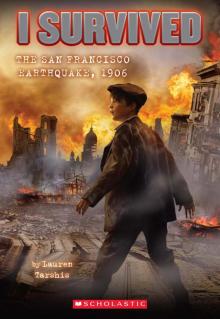 I Survived #5: I Survived the San Francisco Earthquake, 1906
I Survived #5: I Survived the San Francisco Earthquake, 1906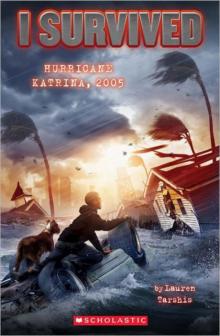 I Survived Hurricane Katrina, 2005
I Survived Hurricane Katrina, 2005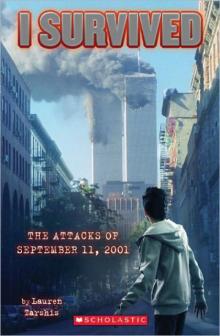 I Survived the Attacks of September 11th, 2001
I Survived the Attacks of September 11th, 2001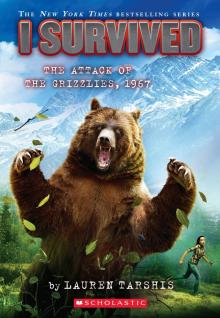 I Survived the Attack of the Grizzlies, 1967
I Survived the Attack of the Grizzlies, 1967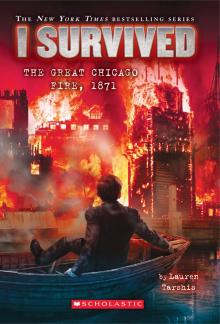 I Survived the Great Chicago Fire, 1871
I Survived the Great Chicago Fire, 1871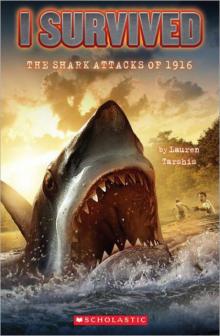 I Survived the Shark Attacks of 1916
I Survived the Shark Attacks of 1916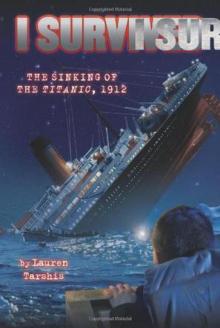 I Survived the Sinking of the Titanic, 1912
I Survived the Sinking of the Titanic, 1912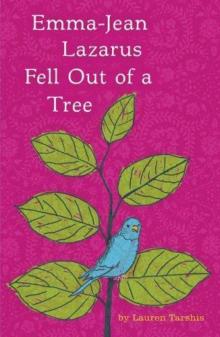 Emma-Jean Lazarus Fell Out of a Tree
Emma-Jean Lazarus Fell Out of a Tree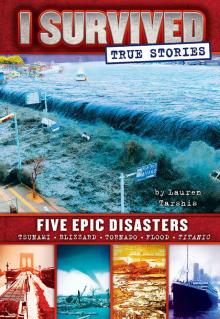 I Survived True Stories: Five Epic Disasters
I Survived True Stories: Five Epic Disasters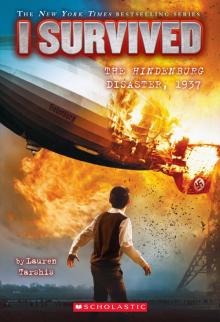 I Survived the Hindenburg Disaster, 1937
I Survived the Hindenburg Disaster, 1937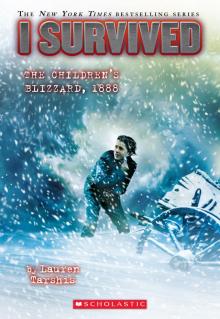 I Survived the Children's Blizzard, 1888
I Survived the Children's Blizzard, 1888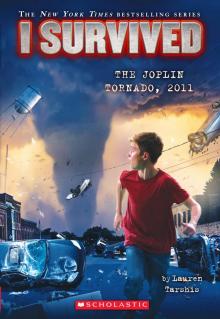 I Survived the Joplin Tornado, 2011
I Survived the Joplin Tornado, 2011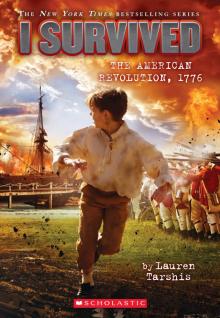 I Survived the American Revolution, 1776
I Survived the American Revolution, 1776 Emma Jean Lazarus Fell in Love
Emma Jean Lazarus Fell in Love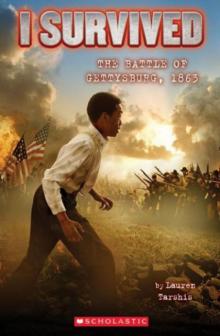 I Survived the Battle of Gettysburg, 1863
I Survived the Battle of Gettysburg, 1863 I Survived the Japanese Tsunami, 2011
I Survived the Japanese Tsunami, 2011